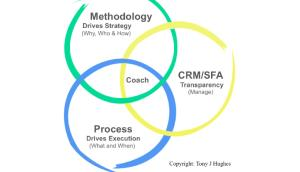
By Tony J Hughes (A reprint from my LinkedIn Pulse page)
Customer churn is a cancer eating away at most businesses.
To combat this and be truly customer-centric, you must have an effective Customer Relationship Management (CRM) strategy supported by the right CRM technology. Yet placing customers at the heart of a business is all about people, culture and processes rather than technology.
Beyond client retention, businesses also need to [private] acquire new customers and this is best driven with Sales-Force Automation (SFA), usually also from within a CRM integrated with other best of breed marketing automation and social selling tools. SFA is about bringing sales and marketing together to align with the buyer's journey and also support sales people's early engagement for proactive demand generation.
But here is an important distinction: CRM and SFA are actually two different things. They may be enabled by similar technologies but real sales enablement is all about methodology, process, training, coaching, playbooks, planning, profiling, research tools, insight creation, and much more. CRM success or failure has little to do with the technology you use and everything to do with how it's implemented. Although it's true that you cannot manage what you don't measure, CRM must be implemented to serve users and customers rather than as a database for management. CRM should be a strategy and a process, rather than a product and reporting tool. The best CRM implementations therefore incorporate sales methodology integrated within an organization's specific sales processes so that sales people can be coached to ensure that tactics and actions are linked to strategy. This approach delivers best practice and accountability in the sales team.
CRM software should be where sales methodology, process and coaching all come together. The system should obsessively put customers at the heart of the organization with account managers and sales people fully equipped through a single view of everything that can be managed. This means integration with social selling tools such as LinkedIn and marketing automation tools is essential. When implementing SFA or CRM, think about the buyer's journey and customer lifecycle... how can you support your sales people to deliver an integrated, high value experience for prospects and customers?
If you valued this article, please hit the 'like' button and also share via your Twitter, LinkedIn, Google+ and Facebook social media platforms. I encourage you to join the conversation or ask questions so feel free to add a comment on this post. Please follow my LinkedIn post page for all my articles. [/private]